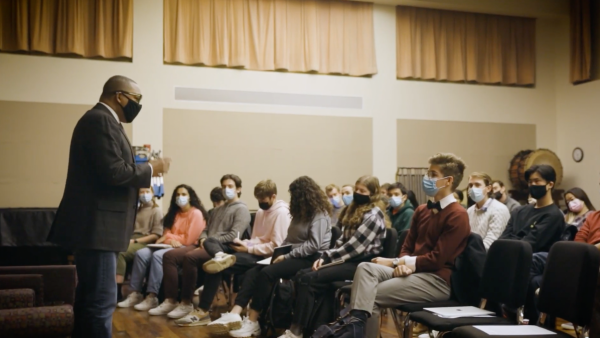Q&A: Wynton Marsalis at Cornell University
ITHACA, NY — Known the world over, jazz artist and composer Wynton Marsalis has earned nine Grammy awards, the Pulitzer Prize for his oratorio of “Blood on the Fields,” and has recorded on more than 70 classical and jazz recordings. He is also the managing and artistic director of jazz at the Lincoln Center in New York City. Currently, Marsalis is the Alfred A. White Professor-At-Large at Cornell University through the end of the year.
Marsalis was recently on the Cornell campus to talk about “Democracy and the University” and to perform a set in the program with his rhythm section, according to the Cornell Chronicle. The evening performance included performing ragtime, blues, and jazz music. The performance was arranged and conducted by James Spinazzola who directs the Cornell Wind Symphony.
In this interview with the Ithaca Times Marsalis talks about the nature of jazz and how it is similar to democracy.
Ithaca Times: This is your second Cornell campus visit since 2018. Can you talk about why music is important for the future and why you came to Cornell now?
Wynton Marsalis: It’s universal. It’s history, it’s coordination, physical activity, spiritual nourishment. People are becoming more separated and more survival of the fittest. Musical conscientiousness is important and it’s not just music. Music is everywhere. It’s life.
IT: I heard your talk about jazz and democracy, but can you share how form and democracy are alike?
WM: There is a Constitution. The Constitution provides us a conduit for which we can have a democratic practice. In jazz we have form, and we take that form and we improvise it, and we play the blues and we swing. In all those forms and those forms facilitate us playing the art of jazz. Of balancing, and in all of democracy, it is about balance of power. Constraining the concentration of agency in every area. A lot of checks and balances.
IT: Jazz is an expression of individuality and it has been important for you to be free to do that. But can you talk some about what democracy requires from the people so that they become more involved in voting and the dynamics of it?
WM: With jazz it is a process of improvisation — which is an individual. And it is also a process of swing — which is not the individual. There is the me and then there is the we, both of those can exist at the same time as in life, and we are constantly negotiating that as in a family. No one lives alone — even if you don’t have a family and you live by yourself — you depend on other people — you do — to keep the lights on too. Anyone who works in a community of people depends on others.
IT: Would you like to say anything more about your love of music?
WM: We are here to inspire. That’s what we are here to do — create inspiration in all seriousness. And I am honored to be here as a professor and coming together with James [Spinazzola].
by G.M. Burns
Source: Ithaca Times

